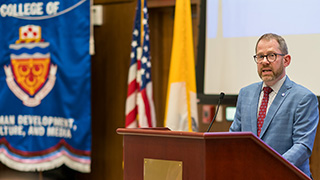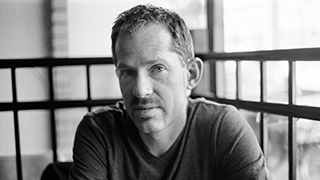The Challenge of Color: New College Dean Cites Interdisciplinary Approach to Education as the Solution
Wednesday, October 25, 2023

Founding CHDCM Dean, Bryan Crable
Dean Bryan Crable is thinking about color, opportunity, and how we as a society conceptualize race, racism, and privilege. For him, as Dean of the newly formed College of Human Development, Culture, and Media at Seton Hall, these ideas are some of the most crucial of our time. So much so that he has been a frequently cited academic pundit on these matters, writing op-eds in outlets like Salon, and speaking to The Rage Podcast about his academic observations. This on its own is a complicated topic, but he has authored a forthcoming book that may provide context: "White Sacraments: Everyday Rituals of White Supremacy" coming next year from Ohio State University Press, explores the history and ongoing challenges of white supremacy that provides a research-based analysis of the nuances of historical prejudice. The solution to increasing self-awareness of prejudice lies, in part, he feels in interdisciplinary education.
It is the consciousness of privilege and learned perspective that made him the candidate of choice for Dean of the College of Human Development, Culture and Media (formerly the Seton Hall College of Communication and the Arts and the College of Education and Human Services). At its heart: inclusivity. "I value inclusivity, and that’s a critical value," he said. "My perspective on my mission as Dean, is for everyone to see themselves as part of the Catholic tradition and mission of the institution. It is about articulating the mission in a way that everyone is included." Crable, who comes to Seton Hall after 25 years at Villanova, saw promise in the Seeds of Innovation, the Academic Affairs organization plan at Seton Hall, under which the position was created and Crable was hired. The Seeds of Innovation is now in its third year of it implementation under the direction of Interim Provost Erik Lillquist who is leading its assessment and charting the next steps.
 "The Seeds of Innovation is about capitalizing on opportunities, and a way to brand Seton Hall as forward-thinking,
interdisciplinary, and a changing face of education in the 21st century," he said.
Crable applied for the role and called doing so a "no-brainer." He loved the focus
on the teacher-scholar model that Seton Hall features, the mission of the institution,
and Seton Hall’s history of increasing access to education. "The ability to open up
access to education and transform lives, which is central to Catholic tradition and
Catholic teaching," was important to him. But it is the interdisciplinary aspect of
the college that is most exciting to him in the day-to-day. "You’re talking about
education, arts, leadership, classroom teaching, and ongoing mental health challenges:
these are all part of, from my perspective, some of the most pressing issues [in leadership]
right now. We can find innovative ways of approaching these problems through interdisciplinary
practice."
"The Seeds of Innovation is about capitalizing on opportunities, and a way to brand Seton Hall as forward-thinking,
interdisciplinary, and a changing face of education in the 21st century," he said.
Crable applied for the role and called doing so a "no-brainer." He loved the focus
on the teacher-scholar model that Seton Hall features, the mission of the institution,
and Seton Hall’s history of increasing access to education. "The ability to open up
access to education and transform lives, which is central to Catholic tradition and
Catholic teaching," was important to him. But it is the interdisciplinary aspect of
the college that is most exciting to him in the day-to-day. "You’re talking about
education, arts, leadership, classroom teaching, and ongoing mental health challenges:
these are all part of, from my perspective, some of the most pressing issues [in leadership]
right now. We can find innovative ways of approaching these problems through interdisciplinary
practice."
Crable wrote his new book after extensive studies on the life of Ralph Ellison. The book, which is in the edit phase, tries to "reorient our conversation around racism and recognize the ways that we contribute to it without recognizing that we are doing it." In his writing and research process, he sought to identify forms that ritual can take, and feels this approach has the potential to generate a lot of thought equity and research that will continue to build awareness of the "ritual system" in applied racist narratives that he is trying to identify. "The author bell hooks talks about ways that whiteness gets reaffirmed," said Crable. "By changing thinking about how we address and combat white supremacy…[it] opens up new routes to the solution."
As to how research critically impacted his new book and the value of research itself to illuminate, Crable said the project illustrated how vital and powerful archival research can be, and how materials from other eras are still, sadly in this case, as relevant as ever. "I looked to the past, to Ellison’s archives…, and through that exploration I was able to see our contemporary moment in a radically new way," he shared. "I have some tips and tricks I’ve developed over the years for archival research but wasn’t fortunate enough to have any coursework on the subject—I’m too old, frankly—and so had to figure some things out on my own."
Paraphrasing Crable, he notes he is an American, who grew up within a specific time in American history. Much of the history talked about in the book reflects the society within which he was socialized, and the kinds of options that were made available at the time. States Crable, "I am deeply connected to all that I write about, and this project has helped me think about myself and about race in popular culture in 2023." He hopes he can lead by example in many ways, especially by encouraging students to explore archival research for projects, so that they see not only the value of it, but also how we can connect the past to the present, towards a goal of positive change.
University Libraries is committed to supporting faculty authors across three campuses – South Orange, Nutley and Newark. All faculty publications are available at Walsh Library and can be viewed here:
• Recent Faculty Books
• Recent Faculty Chapters
• SHU Faculty Publications (2013-present)
Visit the physical display on the 2nd Floor of Walsh Library in South Orange. Any questions about faculty publications can be directed to Maria Barca, Lead Instruction Librarian.
Categories: Arts and Culture, Campus Life, Education

